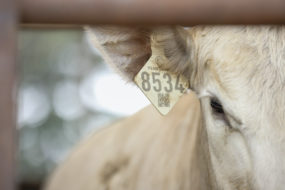If you are anticipating some winter annual forage production, limit graze to reduce overgrazing and try to avoid grazing below 4 inches. This should help improve long-term production and longer-duration grazing, weather permitting. Most everyone knows about high-magnesium mineral, but let’s remember the severity of not keeping out free-choice, high-magnesium mineral or salt when lush grasses are growing in the winter and spring.
Grass tetany often equals mortality and the loss of big dollars. Supplemental feeds with added salt can help ensure consumption.
Bulls can lose up to 3 pounds a day during breeding season. They need flesh as a body energy reserve. Good-quality forage is the ideal platform for bull nutrition, but it may be necessary to deliver a grain supplement. Feeding protein alone will not work to develop appropriate flesh if the available forage is deficient in energy. Energy along with adequate protein will be the most ideal.
Feeding bulls really large amounts of feeds and commodities is also problematic. Feeding large volumes of corn gluten (over 6 to 7 pounds per head) can lead to nutritional issues and severe health issues for bulls as well as cows. Overfeeding bulls can impact fertility much like thin-fleshed bulls. Think “stout athlete.” Bulls ready for turnout won’t have visible ribs, but they shouldn’t be overly greasy either.
The linchpin to cow-calf production is ensuring appropriate nutrition just prior to calving and most certainly during peak lactation. Producers should have a more diligent eye for body condition score and plane of nutrition for the upcoming breeding season. Working with your nutritionist and extension agent to find appropriate commodities or blends is crucial.
Feeding commodities such as whole cottonseed, corn gluten, soybean hulls, corn and distillers and brewers grains are of great value when the forage analysis says there are deficiencies for cows in peak lactation. Although protein is obviously an essential nutrient, it is very important cows in peak lactation are also getting adequate energy. Lastly, extreme cold requires more intake (about 20 percent more) and further increases energy needs. ![]()

-
Jason Duggin
- Beef Extension Specialist
- University of Georgia
- Email Jason Duggin







